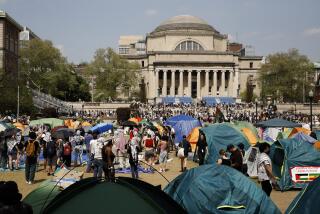Students Defiant as China Moves to Quell Protests
BEIJING — The prospect of confrontation between pro-democracy student demonstrators and security forces loomed today as Communist Party officials declared an end to tolerance of protests--and students planned another march.
A new student-run association linking about 40 colleges and universities in Beijing planned a major protest march from campuses in northwestern Beijing to Tian An Men Square in the city’s center for about 8 this morning, according to student and official sources.
Li Ximing, head of the Beijing Municipal Communist Party and a member of the ruling Politburo, declared at a mass meeting of Communist Party officials Wednesday that authorities are aware of plans for “a large-scale demonstration” today.
“We will deal with it in accordance with the stipulation that no demonstration is allowed without prior approval,” Li said, according to the official New China News Agency.
The crackdown on the escalating student protests began shortly after midnight, when about 100 police officers sealed off Tian An Men Square. The police removed dozens of wreaths honoring the late reformist Communist Party leader Hu Yaobang that had been placed by demonstrators at the base of the Monument to the People’s Heroes in the middle of the square.
The current wave of protests began as mourning for Hu, who died of a heart attack April 15. But the protests soon developed into a broad drive to pressure the government to accelerate the pace of political reform. At least 30,000 students marched to Tian An Men Square before dawn Saturday. They were joined there by 30,000 or more supporters in a demonstration that continued past noon. At times, onlookers swelled the crowd to about 100,000.
Specific demands being pressed by the students include freedom of the press, improved treatment of intellectuals and public revelation of the income and wealth of high officials.
It is rumored among Chinese students that over the past few days, about 10,000 soldiers with special riot-control training have moved into buildings near campuses. Early this morning, small groups of police officers armed with bayonets could be seen patrolling the streets in the university district in Beijing’s northwest suburbs. Members of one group, questioned by foreign reporters, insisted in a friendly fashion that they were an ordinary security patrol that had nothing to do with the student protests.
Li made his announcement of the impending crackdown at a meeting in the Great Hall of the People attended by the heads of Beijing’s 10,000 Communist Party branches. Li said that 60,000 out of a total of 160,000 students at 40 colleges and universities in the capital were boycotting classes Wednesday. Student leaders estimated that 70,000 students were taking part in the strike.
Li said that by putting up big-character posters, organizing unauthorized student unions and carrying out strikes, the students were “stirring up turmoil,” the official news agency reported. It quoted him as saying: “We must firmly stop such riots.”
The official People’s Daily warned in a commentary published Wednesday that the Communist Party and the entire nation face “a grave political struggle” against the challenge posed by the student demonstrators.
Li was quoted as saying that Communist Party cadres must stop their children from attending protest activities and as calling on Beijing residents to “stick to their posts, maintain production and guarantee the supply of daily necessities.”
Beijing Mayor Chen Xitong, who also spoke at the meeting at the Great Hall of the People, made what could be interpreted as a conciliatory gesture toward the students.
“I welcome the students’ demand to publish details of the property belonging to senior leaders,” Chen said, according to the news agency. “Li Ximing and I can take the lead in this respect.”
Premier Li Peng, the official most frequently targeted by protesters for criticism, publicly endorsed a tough stand against the students in comments made at a meeting with a visiting official from Thailand.
“No country, no matter what kind of social system it has, can possibly survive, not to say develop, without a normal social order,” Li said, according to the New China News Agency.
Li was also quoted as saying that the political situation in China is stable and that China will not change its policy of reform and opening to the outside world.
China’s paramount leader, Deng Xiaoping, gave his approval for the crackdown on Tuesday, according to a Chinese journalist who talked with the Associated Press.
“The peasants support us, the workers support us, the army supports us, so why should we be bothered by the students?” Deng said, according to the journalist.
As part of the accelerating crackdown on dissent, authorities announced Wednesday the temporary closing of China’s most liberal newspaper, the weekly Shanghai World Economic Herald, which has been published by the relatively free-thinking Shanghai Academy of Social Sciences.
Jiang Zemin, the Communist Party head in Shanghai, told a meeting of 14,000 party members in an athletic stadium Wednesday that the paper will be “reorganized,” according to a report on state-run television.
Jiang said the government had decided to remove the paper’s editor, Qin Benli, from his post for “serious violations of discipline,” the New China News Agency said.
Late last week the paper attempted to publish unorthodox opinions critical of the early 1987 decision to remove Hu, the late Communist Party chief, from his post. Hu was forced to step down after he failed to suppress pro-democracy student demonstrations in the winter of 1986-87. All but a few copies of the paper’s press run of 300,000 were confiscated by city authorities Saturday.
Staff members at the paper said Wednesday that the city’s propaganda department had taken over control of the publication for an indefinite period.
More to Read
Sign up for Essential California
The most important California stories and recommendations in your inbox every morning.
You may occasionally receive promotional content from the Los Angeles Times.









